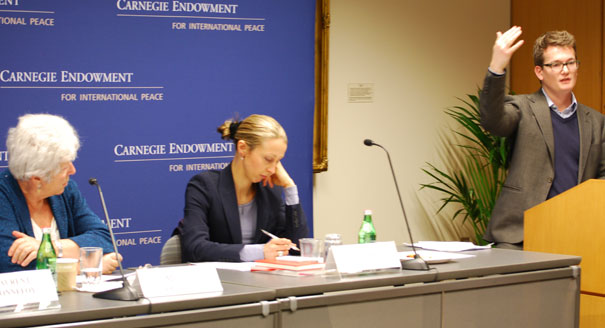Registration
You will receive an email confirming your registration.
IMGXYZ3456IMGZYXThe Salafi movement in Yemen has been mostly apolitical since its founding in the early 1980s, but the 2011 uprising thrust the Salafi groups into politics and deeply transformed them. The importance of the Salafi movement now goes beyond issues of counterterrorism.
Laurent Bonnefoy, author of the recently published Salafism in Yemen: Transnationalism and Religious Identity, discussed the role Salafis are playing in Yemeni politics. Chatham House's Ginny Hill responded, and Carnegie's Marina Ottaway moderated.
The Salafi Movement in Yemen
Bonnefoy pointed out that the Salafi movement is not monolithic. He divided Salafis into three broad types: apolitical, activist, and jihadi. His research, he added, focused on the first two types.
- Founding Father: The Salafi movement in Yemen first emerged in the early 1980s, under the leadership of Sheikh Muqbil al-Waadi'i, Bonnefoy said. Al-Waadi’i established a madrassa, Dar al-Hadith, in the town of Dammaj. Over the next few decades, Salafism developed as a new political and religious identity in Yemen. Bonnefoy described this new Salafi identity in Yemen as a “flexible subculture.”
- Parallels to Youth Movements: The Salafi movement can be understood as in some ways paralleling the liberal youth movements, Hill added. Both serve as a form of self-exclusion or rebellion against parents and corruption in society.
- Apolitical Salafis: The early Salafi movement was apolitical and adhered to a number of fundamental principles, including:
- ‘La Hizbiyya’: A principled rejection of party politics.
- Refusal of Formal Participation: A refusal to engage in political participation and or any formal organization of the movement.
- Allegiance: An allegiance to the Yemeni regime.
- Universalism of Islamic Principles: A firm belief that the Qu’ran and Hadith are applicable regardless of place or time.
- Activist Salafis: A second, more political branch of Salafism, known as the harakiya Salafis, emerged in Yemen in the 1990s, Bonnefoy said. These activist Salafi groups remain ambiguous toward party politics; prior to the 2011 uprising in Yemen, their activity in the political sphere was largely limited to the endorsement of political candidates. Two examples of well-known harakiya organizations in Yemen are al-Hikma and al-Ihsan.
- Role of Saudi Arabia: Saudi Arabia has played a relatively significant role in maintaining the Salafi movement in Yemen, although Salafi groups are not the only beneficiaries of the transnational patronage network that originates from Saudi Arabia, Hill stated. The Saudis have also supported the Saleh family, the al-Ahmar family, and opposition General Ali Mohsen, in spite of the open political competition between these groups. Hill added that regardless of whether Saudi money has bought any real influence over the various actors in Yemen, there is a widespread perception that Saudi Arabia is deeply involved in Yemeni politics, and in particular, in the Salafi movement.
Role of Salafi Groups During the 2011 Uprising
- Politicization of the Movement: Both the apolitical and activist Salafis were pulled further into politics by the onset of the uprising in Yemen and the reigniting of the al-Houthi rebellion in the northern Sa’da province, Bonnefoy said.
- Apolitical Group: The apolitical Salafi movement, currently under the leadership of Yahya al-Hajuri, reiterated its support for the President Ali Abdullah Saleh regime, Bonnefoy explained. This movement claims that the uprising is not internally motivated, but rather an external event manipulated by foreign powers.
- Upcoming Elections: The national referendum, scheduled for February 21, 2012, could be an important turning point for political restructuring in Yemen with several new parties competing, Hill argued. How the Salafi movement will interact with these new parties remains to be seen.
- More to Be Done: Both Bonnefoy and Hill expressed a belief that more needs to be understood about the role of the Salafi groups in Yemen, especially as Yemeni politics enters a new phase.
